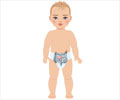A new University of Michigan poll shows that many parents do not follow doctors' orders for their children.

Parents from lower-income households (<$60,000 annually) were more than twice as likely to say they follow provider advice occasionally (17 percent), compared to parents from higher-income households (8 percent). Black and Hispanic parents are twice as likely to follow provider advice only occasionally (22 percent and 18 percent, respectively) compared to white parents (9 percent).
Most parents (56 percent) said they follow provider's advice "most of the time."
Parents were asked to choose the areas where they are most and least likely to follow the provider advice. Among parents who follow provider advice only occasionally, the topics on which they are most likely to follow advice are nutrition, going to the dentist, and using car seats/booster seats.
In contrast, these parents are least likely to follow advice on discipline (40 percent), putting the child to sleep (18 percent) and watching TV (13 percent).
"During well-child visits, health care providers give parents and guardians advice about how to keep their kids healthy and safe. This poll suggests that many parents aren't heeding that advice consistently, putting kids at risk for long-lasting health concerns," says Sarah J. Clark, M.P.H., Associate Director of the Child Health Evaluation and Research (CHEAR) Unit at the University of Michigan and Associate Director of the National Poll on Children's Health.
Advertisement
"Even more concerning is that certain populations (poorer families, non-white families) were more likely to report following advice only occasionally. The children in these populations are known to have higher rates of health problems such as obesity, SIDS, and tooth decay," Clark says.
Advertisement
Among parents who rated their child's provider as "good/fair/poor," 46 percent of those parents said they follow provider advice only occasionally, says Davis, who is a pediatrician.
"This poll suggests that parents need to ask for clarification if they are unsure about what the provider is saying, or why it's important. Providers should work on using clear language, asking parents about their concerns, and giving practical examples of what works with children of different ages,' says Davis."
Source-Eurekalert








